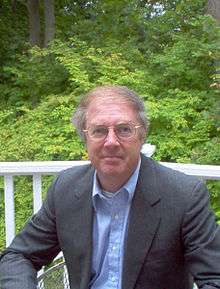Eric Chaisson
Eric J. Chaisson (pronounced chase-on, born on October 26, 1946 in Lowell, Massachusetts) is an American astrophysicist best known for his research, teaching, and writing on the interdisciplinary science of cosmic evolution. He is also noted for his telescopic observations of interstellar clouds and emission nebulae of the Milky Way Galaxy, his empirical attempt to unify complexity science utilizing the technical concept of energy rate density, and his global leadership in improving science education nationally and internationally. He conducts research at the Harvard-Smithsonian Center for Astrophysics and teaches natural science at Harvard University.

He is currently on leave as visiting professor at University of Notre Dame and distinguished fellow at Institute for Advanced Study.
Biography
Chaisson graduated in physics from University of Massachusetts Lowell in 1968 and earned his PhD at Harvard in 1972. He has held professorial appointments at the Harvard-Smithsonian Center for Astrophysics, Johns Hopkins University, Space Telescope Science Institute, and Tufts University, where he was for nearly 20 years director of the Wright Center for Science Education while holding research professorships in the department of physics and in the school of education. He is now back at the Harvard College Observatory and also serves with the Faculty of Arts and Sciences at Harvard, where he teaches an annual undergraduate course on the subject of cosmic evolution that synthesizes the essence of astrophysics and biochemistry.
Chaisson has published nearly 200 papers in professional journals and written a dozen books, several of which have won awards, such as the B.J. Bok Prize[1] (Harvard) for astronomical discoveries, the Smith-Weld Prize (Harvard) for literary merit, and the Kistler Award for increasing understanding of subjects shaping the future of humanity. He has also won scholarly prizes from Phi Beta Kappa and the American Institute of Physics, a Certificate of Merit from NASA for work on the Hubble Space Telescope, as well as fellowships from the Sloan Foundation and the National Academy of Sciences.
Chaisson's major research interests are twofold: His scientific research addresses an interdisciplinary, thermodynamic study of physical, biological, and cultural phenomena, seeking to understand the origin and evolution of galaxies, stars, planets, life, and society, thus devising a unifying cosmic-evolutionary worldview of the Universe and our sense of place within it writ large.[2][3][4][5][6] His educational work engages master teachers and computer animators to create better methods, technological aids, and novel curricula to enthuse teachers, instruct students, and enhance scientific literacy from grade school to grad school.[7][8][9][10]
See also
- Big History
- Epic of Evolution
References
- "Bok Prize". Department of Astronomy. Harvard University. Retrieved 2016-03-06.
- "A Unifying Concept for Astrobiology," International Journal of Astrobiology, v 2, p 91, 2003.
- "Complexity: An Energetics Agenda," Complexity, v 9, p 14, 2004; DOI: 10.1002/cplx.20009.
- "Long-Term Global Heating from Energy Usage," Eos Transactions, American Geophysical Union, v 89, p 253, 2008; DOI: 10.1029/2008EO280001.
- "Exobiology and Complexity," published in 11-volume, Encyclopedia of Complexity and Systems Science, R, Myers (ed.), p 3268, Springer, Berlin, 2009.
- "Energy Rate Density. II. Probing Further a New Complexity Metric," Complexity, v 17, p 44, 2011.
- "Rhythm of the Cosmos: Finding Unity among the Natural Sciences", Tufts Magazine, p 16, Spring, 2001.
- Cosmic Evolution: Rise of Complexity in Nature, Harvard Univ. Press, 2001. ISBN 0-674-00987-8
- Epic of Evolution: Seven Ages of the Cosmos, Columbia Univ. Press, 2006. ISBN 0-231-13561-0
- Astronomy Today (co-authored with S. McMillan), Pearson, 9 editions, 1993-2018.
External links
- Eric Chaisson's curriculum vitae
- Eric Chaisson's web site
- Cosmic evolution web site (containing text, images, animations, movies, and hyperlinked references of interest to both non-scientists {Introductory Track} and professional scientists {Advanced Track}).
- A 60-minute video interview with PBS-Science for the Public 2014: WGBH Forum
- Representative samples of recent research articles: Current Research
- Syllabus of annual course at Harvard: Current Teaching